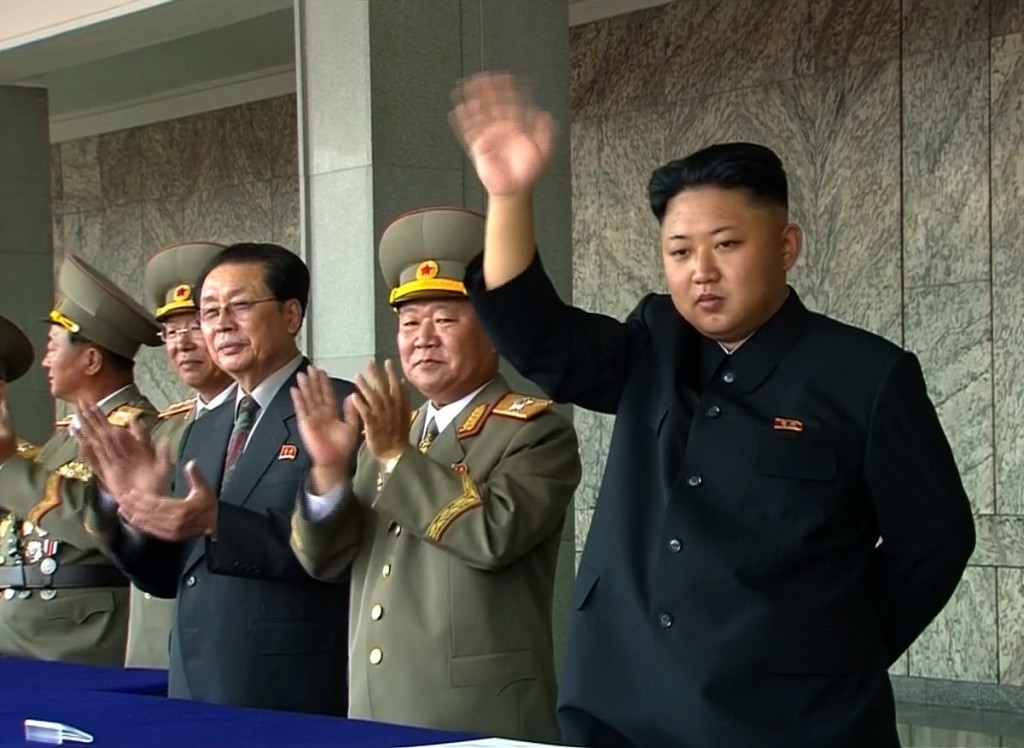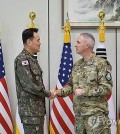- California Assembly OKs highest minimum wage in nation
- S. Korea unveils first graphic cigarette warnings
- US joins with South Korea, Japan in bid to deter North Korea
- LPGA golfer Chun In-gee finally back in action
- S. Korea won’t be top seed in final World Cup qualification round
- US men’s soccer misses 2nd straight Olympics
- US back on track in qualifying with 4-0 win over Guatemala
- High-intensity workout injuries spawn cottage industry
- CDC expands range of Zika mosquitoes into parts of Northeast
- Who knew? ‘The Walking Dead’ is helping families connect
S. Korea to increase humanitarian aid to N. Korea

In this image taken from video North Korean leader Kim Jong Un, right, waves to spectators and participants during a military parade marking the 65th anniversary of the country’s founding, Monday, Sept. 9, 2013, in Pyongyang, North Korea. (AP Photo/KRT via AP Video)
SEOUL (Yonhap) — South Korea will provide more humanitarian aid to North Korea to help ease rising inter-Korean tensions, Seoul’s point man on Pyongyang said Friday.
Unification Minister Hong Yong-pyo said he will make efforts to encourage more private organizations to increase exchanges at a time when the government’s assistance to Pyongyang has been suspended due to 2010 punitive measures on the North for its attack on a South Korean warship.
“What I’ll focus on is how to set up the channel of communications between the two Koreas,” Hong said at a press conference that was held to mark the 30th day of his inauguration.
“The government is weighing how to support private group’s exchanges with the North and how to boost the channel of contact at the non-government level.”
Hong took office on March 16 with a promise to work toward a peaceful reunification and exert flexibility for inter-Korean dialogue if needed.
Inter-Korean relations have been strained as the North has not accepted Seoul’s offer for dialogue, citing the ongoing joint military exercise between Seoul and Washington.
Seoul and Pyongyang also have been in dispute since the North unilaterally decided in February to raise minimum wages by 5.18 percent to $74 per month starting in March for North Korean workers hired by South Korean firms at a joint industrial park in the North.
Inter-Korean exchanges have also been suspended since 2010 when Seoul imposed the May 24 Measure banning economic and cultural exchanges with North Korea following the North’s torpedoing of the South Korean warship Cheonan in March 2010.
Hong said that some “positive” signs seem to be spotted even though the inter-Korean ties are facing challenges.
“Basically, the inter-Korean relations stand at a difficult time, but I think it is positive that contacts between the two Koreas have been maintained, albeit in a limited way.”
He expressed hope that there could be more substantive improvement in inter-Korean relations after April though the ball is in North Korea’s court.















